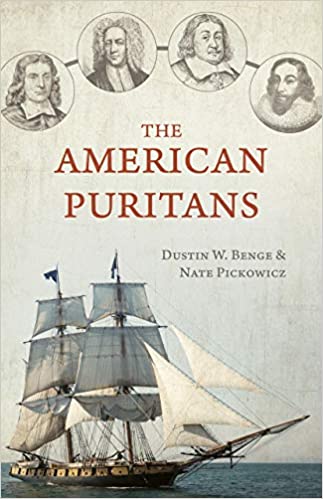A Book Review from Books At a Glance
By Bennett W. Rogers
In The American Puritans, Dustin Benge and Nate Pickowicz tell the story of the first hundred years of Puritanism in America through the lives of nine key figures: William Bradford, John Winthrop, John Cotton, Thomas Hooker, Thomas Shepard, Anne Bradstreet, John Eliot, Samuel Willard, and Cotton Mather. They are convinced that these forgotten spiritual fathers (and mothers) have a great deal to offer the church today, and that the spirit of American Puritanism is a needed corrective to many of her present-day ills. The authors set out to do three things: 1) clarify and correct many of the myths and half-truths associated with the American Puritans; 2) showcase their story – without hiding their faults – in order to inspire and edify this generation of Christian believers; 3) encourage further study into their lives, beliefs, struggles, and accomplishments so that we might have a fair and accurate view of our spiritual fathers.
The book begins with an introduction to Puritanism, more generally, and American Puritanism, more specifically. Technically, it opens with a timeline, which begins in 1534 with Henry VIII’s break with Rome and ends with the death of Cotton Mather in 1728. The timeline does more than highlight critical moments in Puritan history: it connects the American Puritans to the English Reformation, and this connection is spelled out in the introduction.
The Reformation-connection is clearly important to the authors. They believe the American Puritans represent the best of Puritanism and the English Reformation – Protestant and Reformed doctrine, Puritan piety and practical divinity, and a zeal for the purity of the visible church. It is not surprising that the authors, both Baptists (i.e., modern-day separatists), would see these particular Puritans as heroes. What is surprising is that more of their ecclesiological brethren do not.
Part of the reason for this neglect is the steady stream of bad press about the Puritans that has flowed from the pens of their opponents for the last four centuries. In Victorian England, for example, the Puritans were considered fanatics, rebels, and regicides – even by evangelical protestants. Writing approvingly of Puritans earned J. C. Ryle some of the harshest criticism he ever received. Even today the word “Puritan” is filled with all sorts of negative associations – religious hypocrisy, scarlet letters, and witch trials. Therefore, it was not only important but necessary for the authors to attempt to rescue the American Puritans from this underserved reputation.
The American Puritans is a triumph in this respect. The biographical sketches are well-written and well-researched, warm and winsome, instructive and didactic. They focus on ideas as well as events, character as well as accomplishments, defeats as well as victories. They are sympathetic, to be sure, but they are not hagiographic. The authors convincingly demonstrate that the American Puritans were neither hypocritical fanatics nor loveless killjoys. They were not angels, neither were they demons. It is a needed corrective, and one of the most important contributions of the work.
The storytelling was good throughout. Each biographical sketch follows a fairly standard pattern: birth and family, conversion and character, life and ministry. The chapters are linked together chronologically, which gives the reader insight into American puritanism, as well as facts about individual puritans. The authors typically give special attention to a major challenge, conflict, or difficulty that each person faced. At times, I wish they spent more time on these personal crises. These are the moments that I found most edifying, but I understand the need for brevity in a work like this.
Finally, I appreciate the diversity of the subjects. In introducing a subject as inherently ecclesiastical as puritanism, it would have been easy to focus almost exclusively on ecclesiastical figures (i.e., ministers), but that would be a mistake, and the authors wisely avoided it. They chose statesmen, wives, and missionaries, as well as pastors. This not only provides better insight into the movement, but also adds variety and makes for a better ‘read.’ Aim two, check.
Does this work spark an interest in the era? It did for me. English Puritans are well-represented on my shelves. John Bunyan takes up almost 3 feet alone! But aside from a handful of academic works, which happened to be required reading for a PhD seminar on Puritanism, the American Puritans are conspicuously absent. I can only attribute this neglect to a lack of interest. Simply put, I did not think the American Puritans had much to offer me in terms of spiritual sustenance – until now. This work provides an excellent, popular introduction to these neglected spiritual forefathers and foremothers in the spirit of J. C. Ryle’s Christian Leaders of the Last Century or John Piper’s biographical sermons.
Bennett W. Rogers
